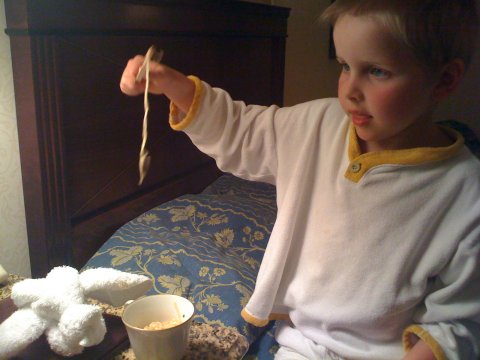One of the recurring themes on Jerry Weinberg’s PSL course (Problem Solving Leadership) was "There are no hard problems, just hard solutions". Often a problem seems hard only because we make it hard, by attempting a hard solution. When we instead open our minds and find the simple solution, the problem suddenly proves to be simple.
I know, it sounds vague. But we saw several examples of this during the course and, since then, I’ve started seeing more and more examples of this in real life. Complex problems that more or less melt away once you realize that it was your solution that was complicating things, not the problem itself.
Here’s a silly but concrete example :o)
A few minutes ago I was trying to teach Dave (5 years) to eat noodles with a pair of chopsticks. After struggling for a while trying to follow my example of how to hold and manuever two sticks with one hand, he lost patience with me. He dumped one stick on the floor and proceeded to gobble up the noodles in no time using just the other stick.
DUUUH! :o)

So despite our initial efforts, eating noodles with chopsticks wasn’t actually a hard problem. It was only my solution that was hard. His solution was simple – and thereby made the problem simple :o)
Sometimes kids can be the best teachers. They are blessed with Beginner’s Mind (Shoshin).




I once asked a Japanese colleague how old Japanese children were when they learned to use chopsticks. His answer was much younger than I expected–younger than American kids were when they learned to use a fork.
He explained that chopsticks were easier than forks, but the way we tried to learn as adults made them seem difficult. I approached my learning a different way (mostly thinking that this should be easy), and became quite a master of chopstick usage (including learning to eat noodles your son’s way).
Just another example, illustrating that thinking something is hard adds to the difficulty.
Fascinating, I’ve watched my daugher (soon 3) use the 1-stick-technique. For kids it’s so easy – it’s the result that counts, but we sometimes hinder them by insisting that they follow our protocol.
Thanks for the post!
what a powerful idea: there are no hard problems, only hard solutions… love it! And your example really helped to understand this idea.
I think we go through school and learn to think that we’re supposed to either remember EVERYTHING rote or come up with a brilliant, clever, complex, new idea. And then we leave school/ varsity and hit the real world and it can take a long time to realize that actually the most important thing is to be able to come up with ideas that work and are useful. Whether they’re simple or complex/ easy or difficult is secondary.
Great post – thanks, Henrik!
Cath
There are even solutions designed by adults and hope that kids can learn better with them 🙂
such as this one in the picture: http://i.stack.imgur.com/yPKey.jpg